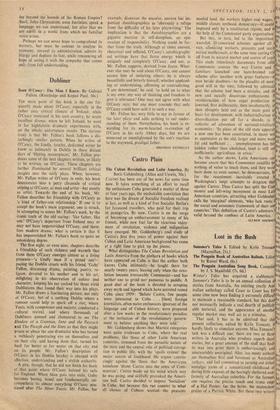Castro Plain
The Cuban Revolution and Latin America. By Boris Goldenberg. (Allen and Unwin, 50s.) CASTRO has been out of the news for some time new. It takes something of, an effort to recall the enthusiasm Cuba generated a matter of three or four years ago, the unshakable conviction that here was the dream of Socialist freedom realised at last, as well as a kind of free Socialist Butlin's for favoured travellers, who paid for their trip in panegyrics. By now, Castro is on the verge of becoming an embarrassment to many of his friends, while new foci for the vicarious enjoy- ment of revolution, violence and indignation have emerged. Mr. Goldenberg's cool study of Castro's first five years of power against their Cuban and Latin American background has come at a right time to pick up the pieces.
What distinguishes The Cuban Revolution and Latin America from the plethora of books which, have appeared on Cuba is that the author both knows Cuba intimately—he taught there for nearly twenty years, leaving only when the revo- lution became irrevocably Communist—and has neither axe to grind nor panaceas to peddle. A good deal of the book is devoted to scraping away myth and legend which have accreted round Cuba since 1959: 'Before Castro, few people were interested in Cuba . . . [then] foreign journalists, often naïve enthusiasts ignorant of the language and of Cuban history, were prepared after a few weeks in the revolutionary paradise at the invitation of the revolutionary govern- ment to believe anything they were told.'
Mr. Goldenberg shows that Marxist categories were quite irrelevant to Cuba, where the real problems, like those of other Latin American countries, stemmed from the parasitic ,nature of the state and the central role of political corrup- tion in public life, with the `spoils system' the major source of livelihood. He argues convin- cingly against the thesis that the Americans Somehow 'drove Castro into the arms of Com- munism'; Castro made up his mind which way he was going, and skilfully provoked the Ameri- can bull. Castro decided to impose 'Socialism' in Cuba, but because this ran counter to what all classes of Cubans wanted—the peasants needed land, the workers higher real wages, t middle classes textbook democracy—it could imposed only by a totalitarian regime, and Wi the help of the Communist party organisation.
But this, in turn, led to the imposition wasteful, ill-conceived schemes against all 3 vice, alienating workers, peasants and uncot mitted intellectuals, at the same time cutting COl off from its natural market and source of capid This study relentlessly documents from oll1l Communist sources the way Castro and familiars launched one hare-brained cos scheme after another with great fanfares—at woe betide doubters—to the plaudits of. men good will in the west, followed by admisst that the scheme had been a mistake, and tb new and equally disastrous enthusiasms. reconstruction of how sugar production lowered, first deliberately, then involuntarily, a then abruptly held out as the main goal a basis for development, with industrialisation a' diversification put off for a decade, is reductio ad absurdum of national-totalitari economics: 'In place of the old state apparat a new one has been constituted, in many w as oppressive as the old, larger and more was ful and inefficient . . . unemployment has bedtes hidden rather than abolished, land is still us y YI)f me
let hei tr te, b te, tut inefficiently, agriculture in crisis.' As the author shows, Latin Americans son o
sie became aware that this Communist caudillo ha's nothing of value to teach them, and they woubiexed have done so even sooner, he demonstrates, bui for the resentment inevitably created b! thr Washington's inept attempts to dragoon the II against Castro. Thus Castro has split the Commie munist and left-wing movement in most Latir American countries, attracting what Goldenberts' calls the `marginal' elements, `who lack roots ir, the social and economic framework of their owc. countries.' This definition of Castro's admirers r: '
valid beyond the confines of Latin America.
ALFRED SHERMA)










































 Previous page
Previous page